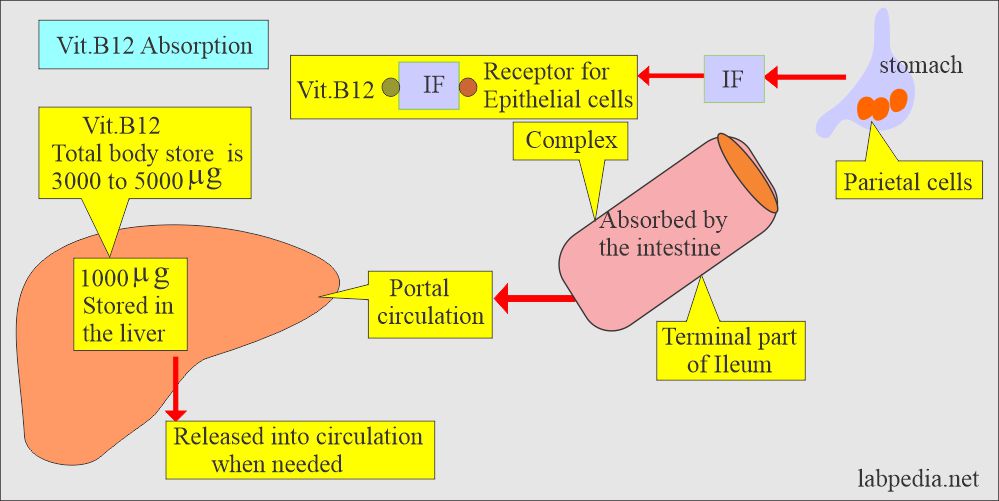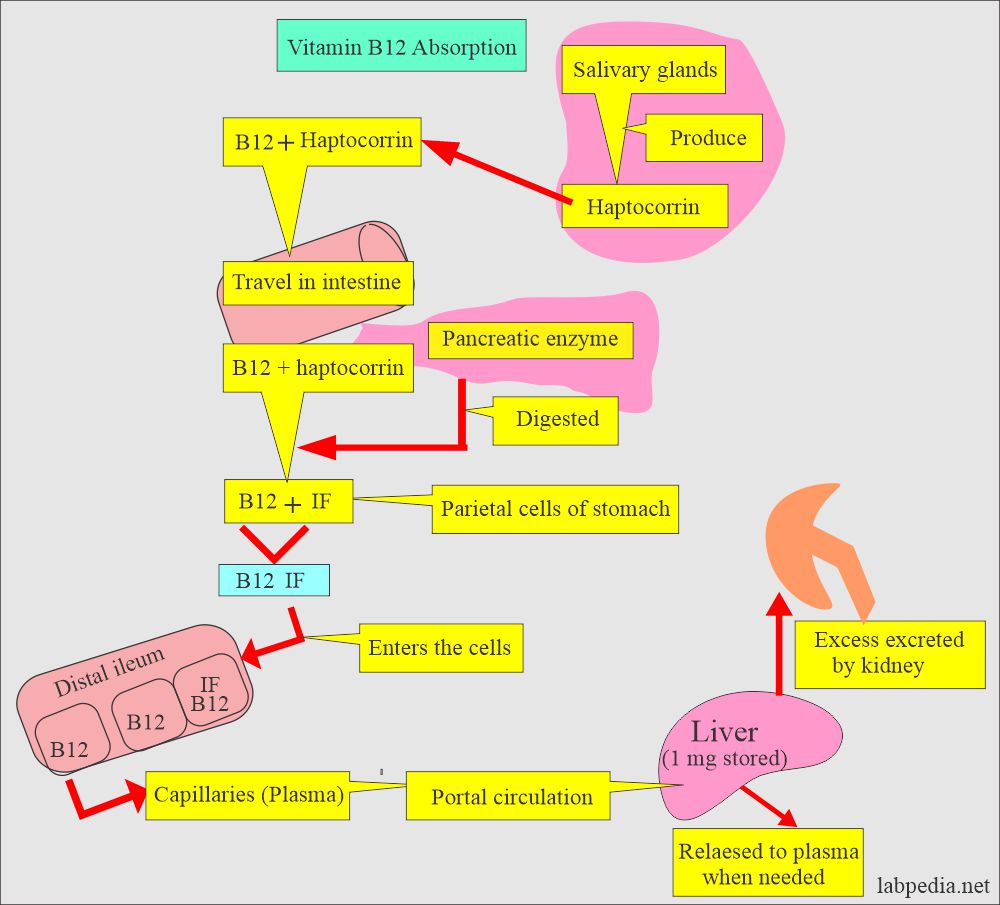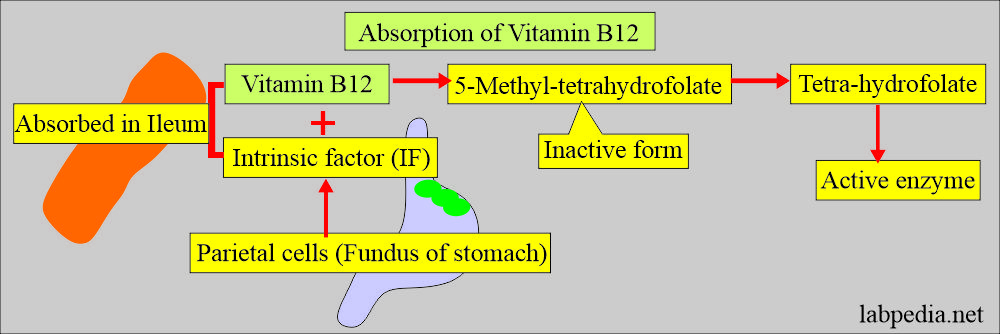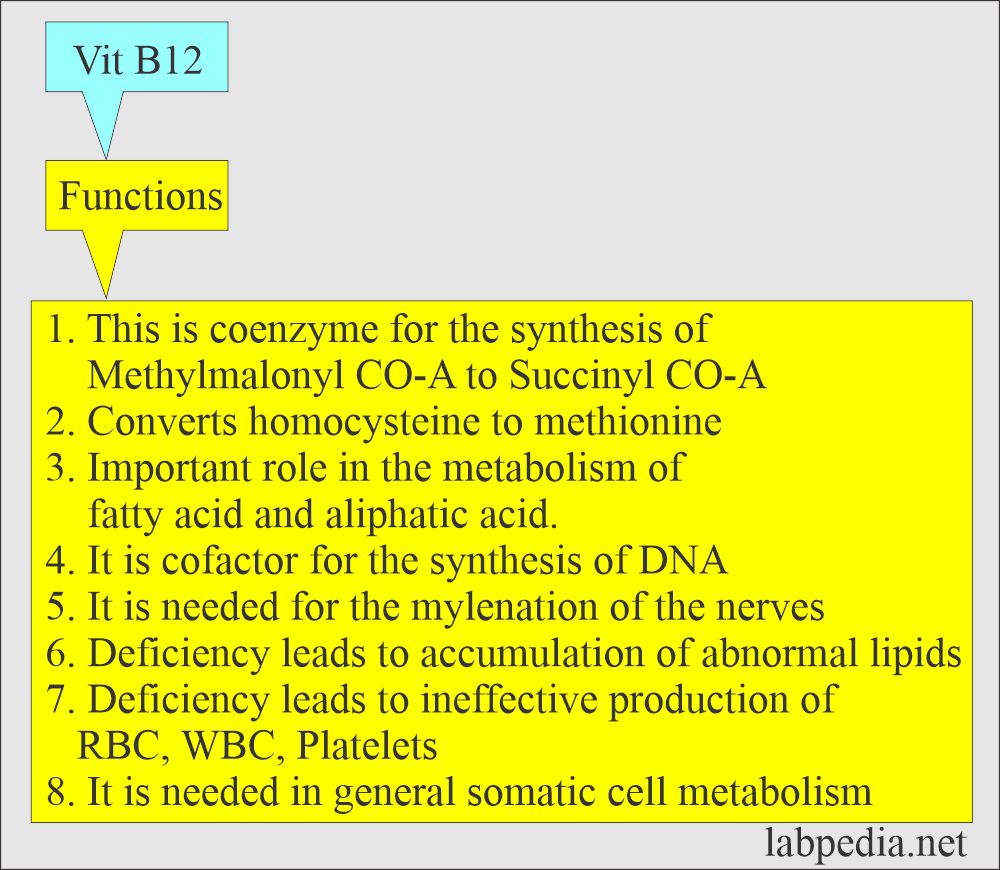Vitamin B12 (Cyanocobalmin)
Vitamin B12 (Cyanocobalmin)
What sample is needed for Vitamin B12?
- B12 estimation is done on the patient’s serum.
- A fasting blood sample is needed.
- The specimen is stable for 8 weeks at 8 °C.
- Twenty-four hours of urine samples are collected.
What are the indications for Vitamin B12 (Cyanocobalamin)?
- To diagnose vitamin B12 deficiency.
- Workup of megaloblastic anemia.
What are the precautions for Vitamin B12?
- Avoid hemolysis.
- Protect the sample from the light.
- Avoid heparin, fluoride, and ascorbic acid.
- Drugs like chloral hydrate increase the B12 level.
- Drugs that decrease the level are alcohol, anticonvulsants, colchicine, oral contraceptives, and aminoglycosides.
How would you discuss the pathophysiology of Vitamin B12?
- Vit.B12 is a complex molecule, and this is also called Cyanocobalamin.
- Its molecular structure = C63H88N14O14P.
- This is a water-soluble and hematopoietic vitamin.
- This has a central cobalt nucleus surrounded by porphyrins like a ring attached to nucleotide and aminopropanol.
- This was also called an extrinsic factor (Vitamin B12).
- The intrinsic factor (glycoprotein) is secreted in saliva and gastric juice for absorption and is produced by the parietal cells of the gastric mucosa.
- Cyanocobalamin is a stable compound that forms dark red needle-like crystals.
- The physiological form of Cobalamin in the serum is Methylcobalamin.
- The deficiency of the Intrinsic factor leads to pernicious anemia.
- Vitamin B12 deficiency may occur due to parasitic infestation like Diphyllobothrium latum, which competes with B12.
What are the functions of Vitamin B12?
- Food produces Haptocorrin (transcobalamin, or R-protein) from the salivary glands.
- It binds to B12 and protects from the acid of the stomach.
What are the dietary sources of Vitamin B12?
- The diet source is meat, eggs, milk, and milk products.
- This is not found in the vegetable.
What is the clinical presentation of the deficiency of Vitamin B12?
- It is due to the lack of intrinsic factor (IF) by the stomach and intestinal malabsorption.
- Without intrinsic factors, the patient will have pernicious anemia and Vit. B 12 is not absorbed.
- In the case of partial gastrectomy, Vit. B12 deficiency may occur.
- Intestinal malabsorption of Vit. B12 is caused by gastrectomy or ileal resection.
- Malabsorption may be due to tropical sprue, inflammatory bowel disease, intestinal stasis, and overgrowth of bacteria in the colon.
- This may occur due to intestinal parasitic infestations like Dophyllobothrium latum, which compete for vitamins.
What are the signs and symptoms of Vitamin B12 deficiency?
- There is megaloblastic anemia (pernicious anemia).
- Patients with pernicious anemia may have atrophic gastritis.
- There is an increased incidence of gastric carcinoma.
- There may be neuropathy.
- Sometimes, there is an irreversible neurological loss like burning pain or loss of sensation in the extremities.
- There may be a weakness, paralysis, or spasticity.
- The patient may develop dementia, confusion, and disorientation.
What is the Normal Vitamin B12 (Cyanocobalamin)?
Source 1
| Age | pg/mL |
|
|
|
|
|
|
Other sources
- Newborn = 160 to 1300 pg/mL (118 to 959 pmol/L)
- Adult = 200 to 835 pg/mL (148 to 616 pmol/L).
Critical value :
- Decreased B12 level = <100 pg/mL.
- Increased B12 level = >700 pg/mL.
- Some references used:
- Normal value as 200 to 900 pg/mL OR
- Other sources = 206 to 678 ng/L.
- Another reference = 110 to 800 pg/mL.
- Normal value as 200 to 900 pg/mL OR
How will you diagnose Vitamin B12 (Cyanocobalamin)?
- The indirect method measures the urinary and serum levels of methylmalonic acid and homocysteine.
- The Patient is deficient in vitamin B12 and secrete excessive methylmalonic acid in the urine. Methylmalonic acid can be measured by gas chromatography.
- Homocysteine levels increase in patients who are deficient in vitamin B12 because their cells can not metabolize homocysteine to methionine at a normal rate.
- Vitamin B 12 absorption test is known as the Schilling test.
- This test can differentiate:
- B12 deficiency (Pernicious anemia)
- Intestinal malabsorption.
- Diet.
- This test can differentiate:
How will you perform the Schilling test?
- This is a two-step test.
- If the first step is normal, then no need to do the second step.
- Ask the patient to empty the bladder.
- Step 1:
- In this test, vitamin B12 is radiolabeled with 57′Co or 58′Co-vitamin B12 is given.
- An oral dose of 0.5 to 1.0 µg radiolabelled vitamin B12 is given.
- Within 2 hours, the patient is injected with a flushing dose of 1000 µg of unlabelled vitamin B12.
- Radioactivity is measured in the urine, feces, and serum.
- Start collecting 24 hours of urine after both doses.
- Measure the number of radiolabelled B12 in the urine.
- If the amount of radiolabelled B12 measured in the urine exceeds 7.5% of the oral dose.
- Absorption is considered normal, and the test is complete.
- The deficiency is considered dietary.
- Step 2:
- This will differentiate between pernicious anemia and other causes of malabsorption.
- Repeat the vitamin B12 doses from step 1, but add the intrinsic factor along with the oral dose of labeled B12.
- Collect 24 hours of urine again and count the radiolabelled B12.
- If the B12 labeled in urine from step 2 is >7.5%, then,
- Malabsorption is corrected by adding intrinsic factors, and pernicious anemia is diagnosed.
- If the result is <7.5%, it indicates other causes of malabsorption, like Diphyllobothrium latum or celiac sprue.
What are the Schilling tests normal values?
- 15% to 40% of 0.5 µg dose.
- 5% to 40% of 1.0 µg dose.
- 24 hours of urine results are:
- Radiolabeled B12 at the first step:
- >7.5% indicates dietary deficiency.
- The result in step 2:
- >7.5% = indicates pernicious anemia.
- <7.5% = suggests another cause of malabsorption.
How will you interpret the Schilling test?
| Disease | With intrinsic factor | Without intrinsic factor |
| Pernicious anemia | Yes | No |
| Congenital deficiency of intrinsic factor | Yes | No |
| Gastrectomy | Yes | No |
| Intestinal malabsorption | No | No |
| Folate deficiency | Yes | Yes |
| Renal failure | No | NO |
| Incomplete urine collection | No | No |
- Intrinsic factor (IF) antibodies can be detected in the serum of patients with pernicious anemia.
- 50% of the patients show these antibodies. In comparison, these are absent in other conditions.
Questions and answers:
Question 1: What is the physiologic form of cobalamin in the serum?
Question 2: What is the critical value of vitamin B12?





Have read there is no longer a shhilling test. Also have high B12 labs but read some anyalyzers use ab and if you have ab then results may be incorrect. Also trying to find way to see what active form B12 by labs as when take B12 feel better !!
Thanks for the comments.